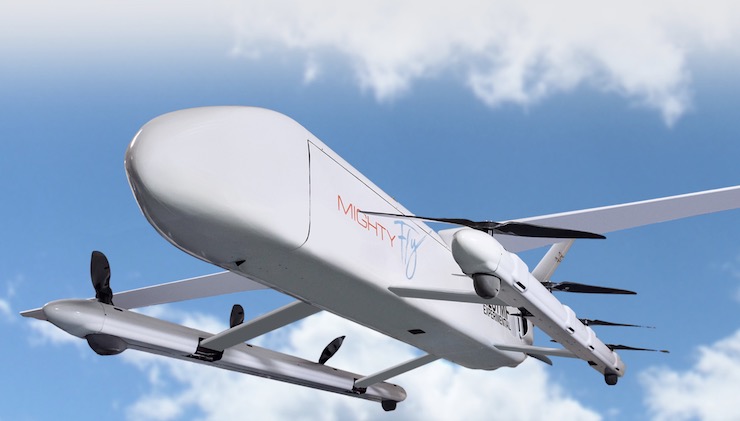IN THE SPOTLIGHT: Manal Habib, CEO and Founder of the Drone Start-Up Mighty Fly

Women are making great strides in the drone industry, especially when it comes to owning and flying their own drones. But men still overwhelmingly dominate the ranks of drone company owners. Are there exceptions? A few.
One is Manal Habib, CEO and founder of Mighty Fly, a San Francisco based drone startup founded in October 2019.
A graduate from both MIT and Stanford, Habib is a true pioneer. She previously specialized in flight control management systems and in fact, developed the first robust commercial drone flight controller. That alone is quite an accomplishment.
But that’s not all. Habib is also a private pilot with tens of thousands of miles under her belt. She’s even in the process of building her own airplane.
Mighty Fly’s website notes: “[Manal’s] passion for aerospace, vision for a better world, and determination make her a motivated and unstoppable entrepreneur and leader.”
Her track record since founding her company proves it. She’s put together a crack team of engineers to develop a fixed wing cargo drone that could soon place her and Mighty Fly on the cutting edge of the UAV industry.
The drone, dubbed “Centro,” is a patent-pending, autonomous, eVTOL aircraft with a cargo capacity of up to 500 pounds, a range of 600 miles, and a speed of 150 mph. A scaled down prototype made its first proof of concept flight in January 2020, and then a full scale test flight in November of that same year.
In April 2021, the Centro received a Special Airworthiness Certificate, or SAC, which is granted by the Federal Aviation Administration (FAA) to drones designated for various commercial applications including aerial surveying, farm management and search-and-rescue operations, among others.
It’s not a complete and unequivocal endorsement of a new drone – at least not for fully autonomous operations at long distances without remote piloting. The SAC designation often comes with a provisional MVP label – standing for “Minimum Viable Product,” suggesting that the aircraft’s use is still “restricted.”
But along with the FAA’s SAC certificate, it is a significant stamp of approval en route to the aircraft becoming fully commercialized.
Aren’t there other U.S-based drone start-ups and prototypes that can match the Cento? There may be, but Habib’s company and its Cento are garnering rave reviews – and offers of business and investment partnerships are beginning to pour in.
Last month, Mitsubishi, the multi-billion dollar Japanese electronics company that has emerged in recent years as a pioneer in the electric vehicles industry, announced that it was creating a massive “next generation” drone logistics hub.
The hub is supposed to integrate the operations of cargo shippers, UAV manufacturers, drone companies and ancillary service providers anywhere in the world. In theory, hub members will be able to tap into a single digital platform, allowing them to easily schedule and manage cargo deliveries via drones, facilitating cooperation, avoiding scheduling conflicts and in theory reducing operational costs as well as the threat of mid-air collisions.
It’s the nucleus of a self-regulating unmanned air traffic management system, or UTM – and a potential private sector counterpart to government-managed integrated air traffic systems like the one scheduled to come online in the European Union this summer.
Mitsubishi only listed a handful of prospective partners in what’s shaping up as a breakthrough technology initiative that could transform the entire drone “airscape” in Europe, North America and Asia in the space of a few months.
And one of those partners – and only one of two small start-ups recruited – was Mighty Fly.
Habib’s three-year old firm is positioning itself for take-off in the burgeoning cargo drone niche – also known as “middle mile” freight delivery – which features the long-distance transport of heavy freight between businesses, rather than retail store consumers.
It’s arguably a far more “scalable” business model than the “last mile” deliveries being pioneered by Amazon, Walmart and other mass retailers that have gotten off to a slow start, due to persistent technological and operational issues and regulatory bottlenecks.
Currently, Mighty Fly is a tiny shop – with just five total employees drawing on vast experience across the globe in avionics and robotics. She met her chief technical officer, Scott Parker, while the two were working together at Zipline, one of the world’s leading unmanned aerial medical supply firms. Her software and hardware engineers, Pter Ptacek and Ian Fernandez have extensive past experience designing drones for Wisk, now Joby. (Fernandez also owns 5 patents). Her business development director, Fernanda Sausen, has spent 20 years creating successful partnerships in the avionics and hospitality industries.
Mighty Fly is a good illustration of what a small start-up powered by engineering genius, keen business instincts and an indefatigable entrepreneurial spirit can accomplish in the global drone industry in a short period of time. And with the exceptional vision of a female CEO leading the way.
|